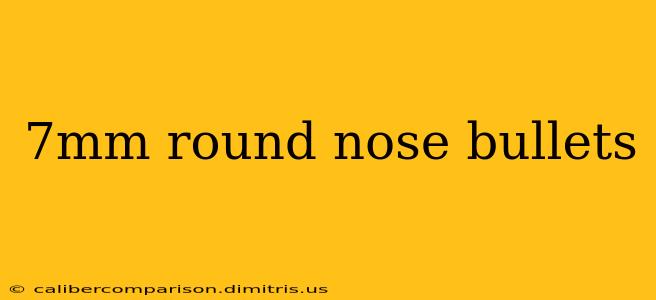The 7mm round nose bullet represents a versatile and popular projectile choice for various shooting disciplines and hunting applications. Understanding its characteristics, including ballistic performance and suitability for different firearms, is crucial for any shooter or hunter considering its use. This comprehensive guide delves into the specifics of 7mm round nose bullets, exploring their advantages, limitations, and optimal use cases.
Understanding 7mm Round Nose Bullet Construction and Design
The term "round nose" refers to the bullet's profile, which lacks the pointed or boat-tail design found in other projectiles. This round shape offers several distinct characteristics:
-
Lower Drag Coefficient: While not as aerodynamic as pointed bullets at longer ranges, round nose bullets generally exhibit a lower drag coefficient at shorter to medium ranges. This can translate to flatter trajectories and higher retained energy within a specific hunting distance.
-
Greater Expansion: The blunt profile of the 7mm round nose bullet is often designed to mushroom or expand more reliably upon impact, leading to significant energy transfer and increased lethality in hunting situations.
-
Reduced Risk of Ricochet: The round shape inherently reduces the likelihood of ricochets compared to more pointed projectiles. This safety aspect is valuable in situations where uncontrolled bullet paths are a significant risk.
-
Suitable for Older Firearms: Round nose bullets are often compatible with older firearms or those with tighter rifling grooves, where pointed bullets might experience higher friction or lead fouling.
Applications of 7mm Round Nose Bullets
The 7mm round nose bullet finds application across several areas:
Hunting:
7mm round nose bullets are frequently used for hunting medium-sized game animals within reasonable ranges. The reliable expansion and energy transfer make them effective for clean kills, although the choice of bullet weight and construction should align with the targeted game. The shorter range suitability makes them ideal for hunting in denser environments.
Target Shooting:
While not typically favored for long-range target shooting due to the higher ballistic coefficient of boat-tail bullets, 7mm round nose bullets are perfectly adequate for short-to-medium range target practice and informal shooting competitions.
Plinking:
Their affordability and relative ease of availability make them a cost-effective choice for casual shooting or plinking.
Factors to Consider When Choosing 7mm Round Nose Bullets
Several crucial factors influence the selection of appropriate 7mm round nose bullets:
-
Bullet Weight: Heavier bullets generally offer greater penetration and energy retention, but at the cost of slightly reduced velocity. Lighter bullets are typically faster but may have less stopping power. The optimal weight depends on the intended application.
-
Bullet Material: Common materials include lead, jacketed lead (often copper or lead alloy), and full metal jacket (FMJ). Each material offers different performance characteristics in terms of expansion, penetration, and overall durability.
-
Manufacturer: Different manufacturers utilize varying designs, construction methods, and quality control standards. Researching reputable manufacturers is vital to ensuring consistent and reliable performance.
Conclusion: Selecting the Right 7mm Round Nose Bullet
The 7mm round nose bullet provides a versatile and effective projectile option for a variety of shooting applications. However, making an informed choice requires a careful consideration of factors such as bullet weight, material, intended use, and the characteristics of your firearm. Always prioritize safety and adhere to responsible firearm handling practices. By understanding these aspects, you can choose the most suitable 7mm round nose bullet to optimize your shooting experience and achieve your desired results.

